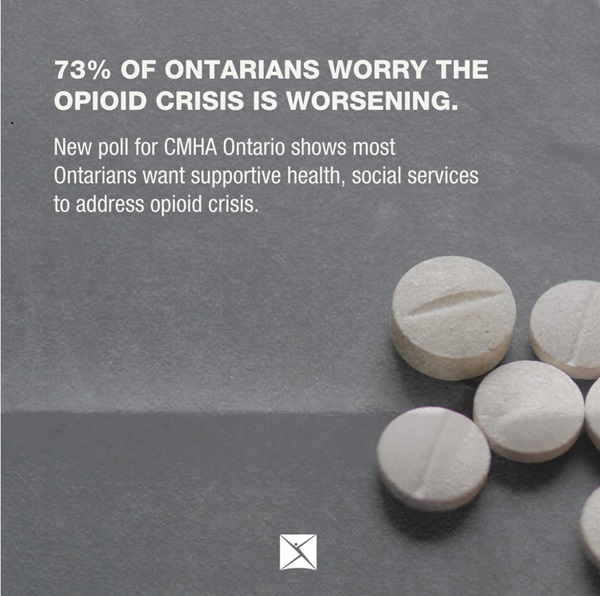Menu
Close

Most Ontarians want supportive health, social services to address opioid crisis: CMHA Ontario poll
Jul 25, 2024
(Toronto, July 25, 2024) – Amid the ongoing opioid and drug poisoning crisis, more than eight in 10 Ontarians would prefer solutions to these issues focused on health care and social services support, rather than punishment through the criminal justice system, according to new poll results released today.
In addition to the overwhelming majority of Ontarians preferring supportive measures to treat opioid addiction and recovery, poll results also showed:
- Almost three-quarters (73 per cent) are concerned the opioid crisis is getting worse
- More than half (56 per cent) report that opioid addiction is an issue of concern in their community
- Nearly two-thirds (64 per cent) express empathy for those affected by an opioid addiction
- Seven in 10 (71 per cent) believe government should prioritize addressing this crisis
This latest data was done for Canadian Mental Health Association (CMHA), Ontario Division by Pollara Strategic Insights.
With close to 3,000 preventable opioid-related deaths in Ontario last year and more overdose surges across the province every day, this poll explored how Ontarians perceive the crisis and the response required. The poll results address the misconception that the crisis has only impacted individuals who are homeless. Research shows that almost 60 per cent of people who died from opioid toxicity were employed.
“The opioid crisis continues to impact every corner of our province and needs urgent attention,” said CMHA Ontario CEO Camille Quenneville. “It’s not just health care and social service providers identifying a need for action. Our latest polling data suggest most Ontarians agree people who use drugs require health care and social services solutions, rather than punitive measures. But we need to act now.”
Despite the majority expressing empathy, 42 per cent of Ontarians also indicated a belief that individuals struggling with opioid addiction are to blame for their problem.
“Unlike the increased awareness of mental health issues in recent years, these numbers show that stigma around addiction continues to impact our community,” said Quenneville. “It’s clear we need more education on addictions to address misconceptions and ensure access to support and treatment for those who need it.”
Pollara’s online research of 1,053 Ontario residents over 18 was conducted from June 21-26. It carries a margin of error of ± 1.9 per cent, 19 times out of 20.
Fast Facts:
- 44,592 opioid toxicity deaths were reported nationwide between 2016-2023.
- In Ontario, the crisis has led to more than 15,000 preventable deaths since 2013.
- The rates of opioid-related hospitalizations and deaths are higher among workers in the construction, mining, oil and gas.
For more information, contact:
Elham Bidgoli
Canadian Mental Health Association, Ontario
T: 416-637-5082
E: ebidgoli@ontario.cmha.ca